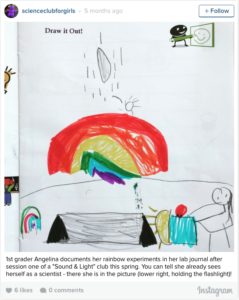Science Club for Girls
The mission of Science Club for Girls, a nonprofit organization founded in Cambridge, Mass. in 1994, is to “foster excitement, confidence, and literacy in STEM for girls, particularly from underrepresented communities…by maximizing meaningful interactions with women mentors.”
Volunteers have been mentoring at elementary schools since the mid ‘90s, but Northeastern was the first school to form a SCFG campus chapter in 2010. Since then, as Harvard and Boston College have followed suit, the program has only continued to grow. Now, Northeastern hosts more than 100 girls every semester.
Student mentors at Northeastern work with the girls over eight weeks. This year, they will teach eight different clubs across age groups, from kindergartners to middle schoolers, who are known affectionately as “STEMinistas.” Each of the clubs will embody a different area of science.
“We do experiments with curriculum that has a common theme,” Kirslis explained. For her first mentorship, she taught a course called “body maps” with second graders.
“We dissected a cow heart,” she remembered. “Every week, we would learn something different about the body.”
Though the curriculum is designed by the organization, it is the mentors who bring it to life, and the enthusiasm of their young students that inspires them to do so. Instilling confidence in the girls, who come from all over Boston to attend the clubs, helps to counteract the challenges of a divided community, where many young girls still have the perception that they won’t be good at math or science.
“There’s a need to inspire young people in the community and to give them access to the idea of college,” said Gail Begley, teaching professor of biology and faculty advisor for the Northeastern chapter of SCFG since 2010. “Anything we can do to get young people interested in science, even if they don’t get involved in that field, is important.”
Begley, who also teaches a service-learning course in collaboration with SCFG, says the girls have a tendency to look up to their college peers in particular. “The mentors are acting as role models,” she said. “As chemists, biologists, and engineers in training, they’re showing that, ‘I’m doing this, and you can do it too.’”–COS article by Gwen Schanker, Journalism and Biology, 2018
Read the full article here: https://cos.northeastern.edu//2016/09/science-club-for-girls/

